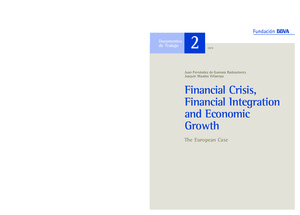Financial crisis, financial integration and economic growth. The European case
"The aim of the paper is to analyze the process of financial integration in Europe and its impact on economic growth since the introduction of the Euro in 1999. In particular, we focus on how the international financial crisis that started in 2007 has affected integration and growth. By combini...
| Main Authors: | , |
|---|---|
| Institution: | ETUI-European Trade Union Institute |
| Format: | TEXT |
| Language: | English |
| Published: |
Bilbao
2010
Fundación BBVA |
| Subjects: | |
| Online Access: | https://www.labourline.org/KENTIKA-19183782124919019649-Financial-crisis,-financial-in.htm |
| Summary: | "The aim of the paper is to analyze the process of financial integration in Europe and its impact on economic growth since the introduction of the Euro in 1999. In particular, we focus on how the international financial crisis that started in 2007 has affected integration and growth. By combining information at country, sector and firm level, we quantify the effect of financial integration on financial development and therefore on economic growth. Our results illustrate that a significant part (65%) of financial development is attributable to progress in integration, accounting for 1% of the euro area's GDP growth over the period 1999-2008. The financial retrenchment due to the crisis in 2008 has limited GDP growth by 0.75 pp which accounts for a very significant part (58%) of the observed contraction of GDP. However, the global nature of the crisis implies that financial integration has not been strongly reversed in comparison to financial development. Therefore, the decline in the degree of integration in 2008 explains a small percentage of the drop in total capitalization and, as a result, its impact on growth is also small." |
|---|---|
| Physical Description: | 38 p. Digital |

